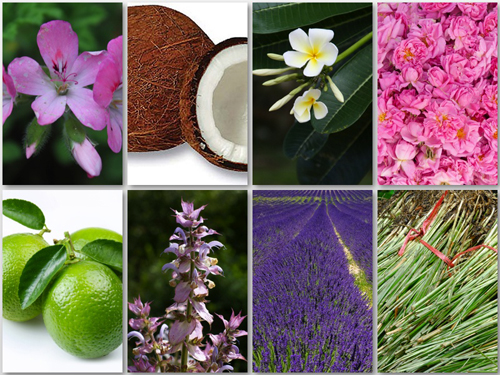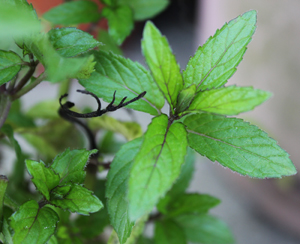The Language of Nature in Summer
Posted on June 25, 2013 0
The Language of Nature in Summer
By Radha Crawley, LMT
This is an article from NAHA's Aromatherapy Journal Summer 2013. 2 edition. Order your copy today!
In Sanskrit, the ancient vibrational language of India, Ayur means life and Veda means science/knowledge of; thus Ayurveda translates to the science/knowledge of life.
Summer is a time for more light, warmth, transformation and expansion. In nature, the plants are fully leafed out and flowers are blooming. The sun is at its apex in the sky offering the most amounts of light and warmth it can. Because of the warmth, lightness and dryness in the atmosphere, Pitta is also accumulating in the body, mind and emotions. Summer is the Pitta time of year in Ayurveda.
Pitta is a Sanskrit word meaning, “that which transforms.” It is one of the three doshas, or elemental combinations in Ayurveda. Pitta is a mixture of the fire element with a little bit of the water element. This mixture produces the qualities of warmth, lightness, dryness, penetrating, sharpness, transformation, subtlety, ascension and expansiveness. This language of nature is giving us the opportunity to grow, shed light on ourselves and transform, just as the flora and fauna do during this season. In Ayurveda the goal is balance. Remember: like increases like; opposites decrease.
The gift in knowing what elemental qualities are present in each season is that we can adjust our daily lives to balance what nature is giving us. For example, in the summer, the atmosphere is filled with heat. We all can feel this in the warmth of the summer air and sun. What is fascinating to me is that even when we spend time in air conditioning, seemingly out of the range of the elements, there is still heat present in the energy of the atmosphere. This means that whether we are inside or outside during summer, we are accumulating heat.
In our bodies our digestive agni, or fire, becomes easily displaced by the increasing heat in the atmosphere. This action brings this fire to the surface of the skin, potentially causing skin rashes, prickly heat, and other skin inflammations. This heat can also rise up to the head causing criticism, irritation, jealousy, anger, and judgmental attitudes. In the digestive system excess heat can cause diarrhea, heartburn and acid reflux.
If Pitta is the predominant dosha in the body, which can be determined through an Ayurvedic Consultation, the person will be even more prone to these imbalances during the summer season. A true Pitta person will have a sharp intellect, be socially adept, a natural leader, and possibly be an actress or politician, and enjoy the spotlight. They will have a moderate frame that demonstrates medium proportions. They gain or loose weight easily. Their skin type is sensitive, burns easily and can be oily with copper or yellowish tones. They are often thirsty and enjoy cold drinks. Pittas also yearn for, and crave, competition and physical activity.
When a person has too much Pitta accumulation from their lifestyle, or in the presence of summer, they tend to feel easily aggravated, “hot-headed,” overly competitive, sarcastic, and are likely to experience skin rashes, diarrhea, yellow-brown tongue coating, and may comment that everyone else is “wrong, slow, and dumb.”
There are many ways to balance Pitta in the body, mind and emotions. Remembering like increases like and opposites decrease, we will naturally turn to activities, thoughts, foods, and practices that encourage coolness, rest, relaxation, heaviness, contemplation, softness and gentleness. Since Pitta (fire and water elements) can also accumulate in the eyes, digestive system, liver, skin and heart, we can use cooling diaphoretics on the skin such as Roman chamomile (Chamaemelum nobile), coriander (Coriandrum sativum L.), lemon balm (Melissa officinalis) and peppermint (Mentha x piperita); and cooling nervines such as champa (Michelia champaca), rose (Rosa damascena), neroli (Citrus aurantium bigaradia), jatamansi (Nardostachys jatamansi), vetiver (Vetiveria zizanioides) and jasmine (Jasminum officinale).
Here are more ways to balance the summer heat:
- Start the day with an intention for spiritual growth.
- Scrape your tongue with a tongue scraper. Take note of the color of the scrapings. Greenish yellow means there is a Pitta imbalance. White is excess ama, or toxins in the body. White can also mean a Kapha imbalance. Gray or brown is a Vata imbalance.
- Use a refreshing tooth powder that contains neem (Azadirachta indica) and peppermint (Mentha x piperita) on your toothbrush.
- A gentle self-massage using coconut oil (Cocos nucifera) or Pitta abhyanga oil (recipe below), slightly warmed to body temperature will nourish the skin and help remove excess heat. Follow the massage by rinsing with lukewarm water in the shower.
Abhyanga is Sanskrit for loving hands. Abhyanga is a loving massage that is given to oneself or another using beneficial oils and aromas to soothe the body, mind and spirit.
Summer Abhyanga Oil

- 2 oz organic coconut oil (Cocos nucifera)
- 6 drops vetiver (Vetiver zizanioides)
- 5 drops lavender (Lavandula angustifolia)
- 4 drops rose (Rosa damascena)
- 3 drops champa (Michelia champaca)
- 2 drops clary sage (Salvia sclarea)
- 1 drop rose geranium (Pelargonium graveolens)
- 1 drop lime (Citrus aurantifolia)
Summer Sugar Scrub
One to two times per week, enjoy a gentle sugar scrub to exfoliate, nourish and soothe summer skin on legs, arms, stomach, chest and back.
- ¾ cup raw cane sugar
- ½ cup brown sugar
- 1/8 tsp fresh lime peel (Citrus aurantifolia)
- 1/4 cup (more or less depending on desired texture) organic coconut oil
- 25 drops lime (Citrus aurantifolia) essential oil
Mix well and place in a plastic or glass jar to place in your shower.
- Walk in dew filled grass for a calm and peaceful start to your morning.
- Start your meditation and yoga practice with sitali pranayama. This is a breathing practice where the tongue is rolled into a tube and cool air is brought in through the tube and out of the nostrils.
- Do some abdominal stretches, twists and massage exercises to clear Pitta from your belly.
- Avoid excessive inverted poses in the summer months as this brings more heat into the head.
- After yoga, anoint your self with rose or vetiver on the third eye, throat and navel to keep these centers cool, calm and collected.
- Eye exercises will relax the eyes, and increase circulation that will carry away excess heat. You can also try netra tarpana, an Ayurvedic practice in which ghee is melted, placed into eyecups and put over the eyes while practicing eye exercises.
- Diet in the summer should consist of: bitter, sweet, astringent flavors. Examples of beneficial foods are: coconut, lime, cilantro, dandelion, pomegranate, pear, lettuce, spinach, kale, most grains, beans, almonds, lean protein, paneer, ghee, turmeric, fennel, coriander and rose petals.
Enjoy Open Heart Tea daily

- 3 parts fresh mint (Mentha piperita) leaves
- 2 parts hibiscus (Hibiscus sabdariffa) petals
- 3 parts rose (Rosa damascena) petals
- 15 parts water
Bring water to boil. Pour over herbs, steep for 15 minutes. Strain out herbs and allow to cool. Drink and be happy!
- One should make certain to eat regular meals and lunch by 1:00 pm.
- Late night walks in the moonlight are a soothing way to bring the cool, moist energy of the moon into the body.
- Spend time in nature enjoying and swimming in a river, ocean, lake, stream, etc.
Overall, summer is the time to harness the power of the sun for expansion, growth and transformation in all areas of our lives. However, we must remember to occasionally stop and rest, go swimming, take a moonlit stroll, or nap in a hammock in order not to burn up all the sweetness that sustains us in the long haul. In other words, pace yourself and know that nature is supporting you to transform your ideas and grow your dreams.
Biography:

Radha Crawley is a LMT and Certified Ayurvedic Educator. Radha has successfully incorporated holistic health into her families’ lives for well over a decade. Her Ayurvedic training began at Kayakumari School of Ayurveda where she studied Ayurvedic Body therapies, Panchakarma and received her Certificate in Ayurvedic Education.
Radha will complete her Bachelor of Arts degree from Prescott College in 2013 in Holistic Health and Transpersonal Psychology. She is also honored to be currently studying with an Ayurvedic Doctor, Vaidya Mishra Bachelor of Ayurvedic Medicine (BAMS), of the Shankya Vansya Ayurveda lineage and Maya Tiwari of Wise Earth Ayurveda®. She is the owner of Samadhi Ayurveda in spiritual Sedona, Arizona.
Radha can be reached at: radhacrawley@gmail.com; www.samadhiayurveda.com; or by phone at: (928) 821-1301.
Comments
No comments yet for this entry.
Please Log In to post comments